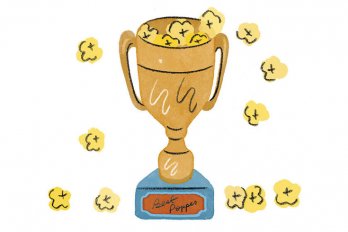PLYMPTON, N.S. — Massive numbers of dead starfish, clams, lobsters, and mussels have washed up on a western Nova Scotia beach, compounding the mysterious deaths of tens of thousands of herring in the area. The Canadian Press. December 28, 2016.
A lobster entered through the side door. He paused for a moment as his eyes adjusted to the dim light. Aside from the furniture, the place was mostly empty. He made his way past the tables, finding support along the backs of empty chairs, and took his regular stool at the counter.
A bar clam shuffled over, turning a towel in a glass. “You’re late,” he said.
“I missed happy hour, did I?”
The clam grinned as he poured a drink. When he set it down in front of the lobster, he said, “It’s good to see you, Homer.”
Homer noted his friend’s swollen foot, the chips along his shell. “We keep coming back, don’t we, Lew?”
“You keep coming back,” Lewis corrected. “And someone’s got to pour your Scotch.”
Homer’s bent antennae still rose and bobbed when he chuckled.
Lewis shuffled off to serve a crust of barnacles, and Homer slumped over his glass. He sat like that for several minutes, braced against the counter with his claw and first legs. He gazed past his reflection in the mirror behind the bar. Beyond his own battered rostrum, there were few signs of life. A clutch of mussels conferred quietly in one of the booths. A blue crab sipped gin with stoic concentration. There were no fish.
Last summer, the bar had brimmed with herring. They slapped fins on tables and filled the water with silver flashes and the burbling din of chatter. Lewis struggled to keep drinks balanced on trays as they arced and dipped across the room. A few of the fish became frequent guests among the group of hardened reporters that gathered at the far end of the bar, beneath the vintage movie poster of a giant squid. Although they tried to disguise it, the herring were clearly hoping for scraps of insider information from the journalists. And, although Homer and his colleagues tried to disguise it, they grew fond of the young fish. Or, at least, of the attention.
Homer remembered with regret the afternoon he opened the side door to find two of his young friends crowding the alcove, passing out leaflets that urged Direct Action.
“Homer, are you in?” they asked.
“Almost,” he replied, stepping around them to take his seat at the bar.
Now, the room was eerily quiet.
Lewis returned, stood across the counter, and sighed. “Let’s hear it, then,” he said. “You were at the front from the beginning, eh?”
“Yeah, late November. I made it to the beach while the herring were still schooled at the tide’s edge. When they mobilized, there wasn’t any signal I could see. They all just knew it was time, didn’t hesitate, didn’t blink.”
“Herring,” said Lewis, shaking his head. “It’s like they share one brain—a small one.”
Homer cocked an antenna. “Don’t pretend you didn’t join them.”
The bar clam smiled grimly. “I never expected to. At the end, it seemed like everyone was signing up. I figured I couldn’t stay behind while others were up there fighting for our home.”
“You’re solid, Lew.” Homer paused. “Besides, we both know self-preservation is a moot point these days.”
Lewis grunted affirmatively. “I read your article after that first attack. Stood right on this spot and read how the herring rode the rising tide—how the ones who got pulled back into the water fought their way back onto the land—to meet the enemy on its own turf. And how all those fish ended up draped across the rocks and eelgrass, drying out in the sun. I couldn’t get that image out of my head. That was just before my sister’s babies died. Malformed shells . . . ”
Homer regarded his friend carefully. “Shit . . . I’m sorry.”
“There were a lot of bivalves saying we should just pack up and move deeper, abandon the shallows for less troubled waters. You know me, Homer—all I ever wanted was to work my bar and lay low.”
“But you still signed up?”
Lewis shrugged. “I couldn’t face going down without a fight, I guess.” He stood straighter, scanned the room, and shuffled off again. Homer eyed the green glass bottles arranged along the lintels, all still in place. Nothing had changed apart from the sense of vacancy, which had settled in the bar like silt.
The side door opened, letting in a momentary burst of light. Homer didn’t need to turn around to know that it was Astrid; the water that flowed past her reached his remaining antennae. In the mirror, he saw her five-pointed silhouette, then she was beside him at the bar.
“Hello, lobster.” It was the way she’d always greeted him.
Of the two of them, Astrid had been more sympathetic to the cause. Homer recalled how, after their editor-in-chief had died of a ruptured statocyst, she paced the newsroom floor, spewing torrents of sorrow and rage: the six-pack rings, the oil slicks, the stifling warmth, and the maddening, constant roar. Few other starfish spoke about it, electing instead to keep their faces pressed to stone, but as long as Homer had known her, Astrid had been railing against it. She had a fierce love for the rocks and the tides, and she believed the rocks and the tides loved her too.
Homer had lived longer. He knew there was nothing in the world to which one could cling. Conditions changed, and though the struggle to hold on might be noble, it was primarily in vain. The last time Homer had seen Astrid, the two of them were preparing to leave for the front. As reporters, they were officially noncombatants, but Homer knew that she had gone in armed.
In the bar, Homer turned to look directly at the red starfish. She met his gaze for a moment, then looked away. He noticed a patch on her right arm where some feet had been torn off and infection had set in. Absentmindedly, her pedicellariae worked the area.
Lewis appeared at the other side of the counter. “Welcome back, my dear,” he said, placing a vodka soda in front of her.
“Lew, I knew you’d make it back.” She reached across the counter to give the bar clam’s mantle a gentle squeeze. “How are you?”
“Oh, I always manage. You look fresh as the spring jet stream, my dear.” Before Astrid could argue, Lewis shuffled off. She picked up her drink.
“That was a good story you had in the Post,” Homer said, “about the humpback.”
“Thank you,” said Astrid. “They never would have expected that, the herring.” She was looking at the empty bar reflected in the mirror. “I wrote it hoping there would be a survivor somewhere. But, of course, by the time it came out, they were all dead on the rocks.”
Someone behind them laughed too loudly. Astrid turned to glare at a trio of green crabs.
“They thought they were invincible,” said Homer. “I think they truly believed that they would make it back. Maybe, someday, they will.” He finished his Scotch and added sadly, “I love the herring.”
“You’ve been drinking,” said Astrid. “You only use that word when you’ve been drinking.”
“I always use that word,” said Homer. He tried to meet her eyes in the mirror, but she was looking down. “I love them for the same reason I used to mock them: they think they can change the world.”
“Maybe they can. Who else has the numbers? Who else can replace themselves so quickly?” Astrid’s pedicellariae paused as she explored the idea. “Despite everything, despite the rest of us getting worn down and tired, they stayed so full of life. Maybe they’ll come back. Even if they can’t change the world, maybe they can survive it.”
She sipped her drink and winced. The vodka had settled on top.
“So how did you get the story?” Homer finally asked.
“The whale? A gull told me.” Astrid looked over at Homer with an ironic smile. “Actually, I was hardly listening to the story when I first heard it. I was at the high-tide line with this young crab, this kid who was barely hanging on. A gull landed too close and cocked her head, sizing him up. I called out to her, real casual, and asked if she had ever seen anything like it, all this death on the beach. And she just started laughing. ‘You, you, you,’ she wheezed, ‘you have no idea what you’re up against.’ She told me she had seen more dead fish piled on a single barge in the harbour than on this nothing little beach. She said even the whales were powerless to stop it—that, in fact, a whale had just washed into our cove that morning. She clearly enjoyed bearing bad news, so I just kept asking questions.”
“Did it work? Did the crab make it?”
“He did. His leg was badly crushed, but he slipped back into the water while she was gabbing at me. They’ve always liked to talk, the gulls.”
Homer reached out to clink her glass, and they each took a sip.
“The whale and his mother had travelled up from the gulf,” Astrid continued. “Somewhere along the way, they ran into a wall of noise, something massive, and got split up. She panicked, tried to make it over to him, swam too close to a propeller. He floated by her side until she died.”
“God,” said Homer.
Astrid nodded slowly. “She couldn’t breathe, her blowholes were so mangled. Doesn’t that make you sick? It makes me feel that way.”
“If I think about it, yes.”
“Anyway, the story goes that a pod of humpbacks eventually came across the son. They sang to him, but he wouldn’t sing back. When the herring showed up, he didn’t even try to eat them. Instead, he listened. They were bubbling with all that talk of rebellion. I think they gave him a reason to return to life, if only for a bit.”
“By the time he washed in with the last of the fish, everyone was either dead or exhausted,” said Homer. “We took the whale’s arrival as a kind of signal, the definitive end, so few of us to
see it . . . ”
A cool current drifted through the open windows, carrying oxygen and the mineral smell of the deep. In happier times, it would have been energizing. Homer looked at the empty stage where the fiddler crabs used to play. Maybe someday they, too, would return.
After each customer had paid and departed, and after more than an hour had passed with no further visitors, Lewis closed up early. He flipped the sign and tallied the day’s meagre earnings. As he dragged a mop across the floor, around the legs of tables stacked with upside-down chairs, the bar clam considered the future. Business was unlikely to pick up anytime soon, if ever. Supply had grown more expensive, and the ranks of his customers were severely depleted. Perhaps it would be best to cut his losses. Maybe he could sell the bar, move deeper, and start again.
The chores were done. There hadn’t been much to clean up. Lewis crossed the floor, climbed the stairs to the alcove, and hit the lights. What daylight remained lay draped across the booths, gently undulating. It reflected into the lintels and rafters, illuminating the objects arranged there: a postcard from a mackerel, coloured glass floats, a ukulele the mollusk had been given on his birthday.
Motes of phytoplankton floated in the light. “Alright,” the bar clam muttered, “alright.” Then he shuffled out the door and locked it behind him.






